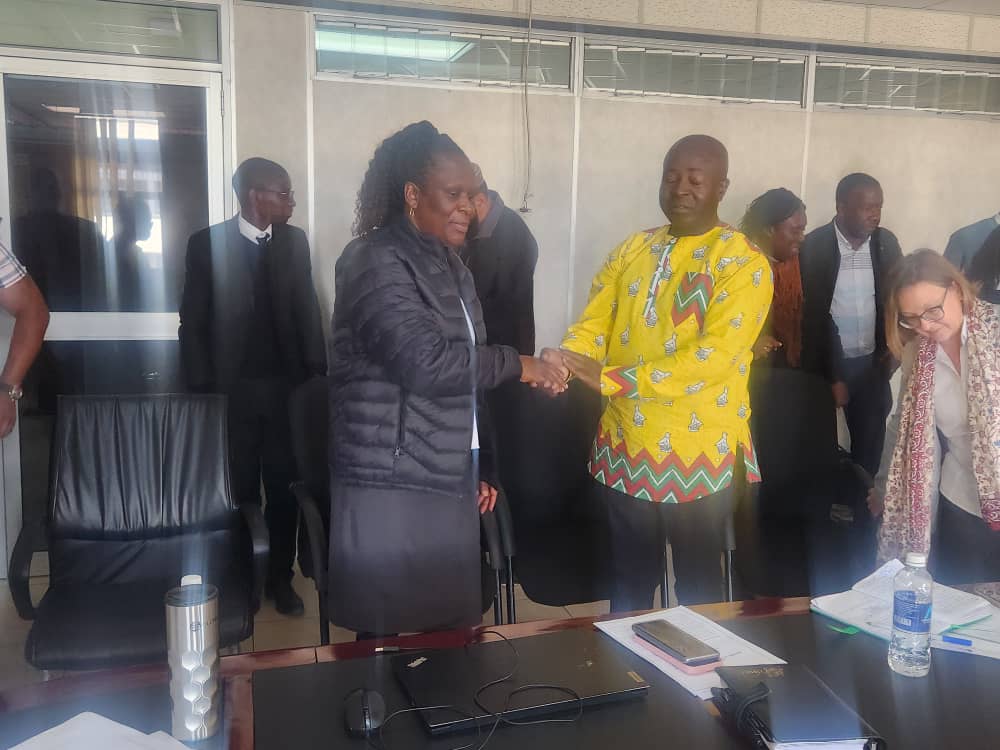Current Affairs
Business simplification: CZR, ZIMRA New Collaboration

The Confederation of Zimbabwe Retailers (CZR) and the Zimbabwe Revenue Authority (ZIMRA) have launched a joint initiative aimed at simplifying business processes and promoting fair taxation, in a move expected to drive economic growth and improve compliance.
This collaborative effort seeks to streamline tax obligations, reduce administrative burdens, and create a more business-friendly environment.
Speaking during the CZR-ZIMRA Stakeholder Engagement Meeting, CZR President Dr. Denford Mutashu urged ZIMRA to urgently review current tax systems to improve the ease of doing business in the retail and wholesale sectors. He highlighted the importance of improving tax compliance within the informal sector.
“Many informal traders operate outside the tax net and are not subject to VAT or other obligations. This makes their products appear cheaper than those from compliant formal businesses, distorting fair competition,” said Dr. Mutashu.
He proposed that ZIMRA remove the current 5% withholding tax on sales made to non-tax-compliant customers and called for a simplified tiered presumptive tax system to encourage voluntary compliance among informal traders.
Dr. Mutashu also recommended that Taxpayer Identification Numbers (TINs) be made mandatory when applying for shop, trading, and liquor licenses to enhance tracking and enforcement.
During the engagement, he posed a question to ZIMRA Acting Commissioner for Domestic Taxes, Mrs. Mupanduki, regarding the proportion of revenue currently collected from the informal versus formal sectors. He also raised concerns about Route-to-Market (RTM) restrictions.
“Current RTM policies require even small walk-in customers to present VAT registration and tax clearance certificates to purchase goods at wholesale prices. This hinders competitiveness and discourages bulk buying,” he said.
CZR called on ZIMRA to review and relax RTM requirements to enhance market access and support formal wholesalers.
Concerns Over IMTT, Delayed Refunds, and VAT on Overheads
CZR raised further concerns over the Intermediated Money Transfer Tax (IMTT), noting that it disproportionately affects formal businesses that rely on electronic payments, while the largely cash-based informal sector escapes the tax.
They proposed:
- Reducing the IMTT rate to 1% for US$1 transactions
- Waiving the IMTT entirely for ZIG transactions
Dr. Mutashu also inquired about when the IMTT would be reviewed or removed, citing its adverse effects on formal retailers.
He further expressed concern over delayed tax refunds, particularly VAT refunds, which are often held up for over a year, impacting liquidity.
“ZIMRA charges interest on late tax payments, yet there is no compensation when the tax authority delays refunds,” he noted.
CZR recommended that ZIMRA:
- Establish clear turnaround timelines for tax refunds
- Apply interest on overdue refunds owed to taxpayers
On the issue of VAT on overheads, CZR pointed out that businesses selling VAT-exempt basic commodities cannot reclaim input VAT, increasing operational costs and threatening viability for low-margin retailers.
The organisation called for a review of VAT policies, particularly on reclaiming VAT on overheads for retailers of basic goods.
Dr. Mutashu also highlighted flaws in the PAYE system, citing discrepancies between calculations on ZIMRA’s TARMS platform and company payroll systems. He noted that employees with incorrect or unregistered national IDs could not be processed in TARMS.
“There’s no option to use a generic employee number when submitting VAT on such employees,” he said, recommending interim solutions like generic codes and better system alignment.
Rising property tax was also flagged, with landlords transferring increased tax costs to tenants, adding to the financial strain on retailers.
ZIMRA also raised its own concerns about the treatment of goods at ports of entry, especially regarding inspections.
“Trucks headed to their final destinations are being intercepted and redirected to Bak Storage, despite prior checks at the border,” said a ZIMRA representative.
“This causes delays and results in additional costs for storage, labor, and handling. Some shipments are also being damaged during re-inspection.”
In response to the issues raised, ZIMRA reaffirmed its commitment to improving the ease of doing business and expressed support for the tiered presumptive tax model.
The authority encouraged the increased use of plastic money for tax administration purposes and acknowledged resource constraints in fully integrating the informal sector into the tax system. It was noted that informal sector taxes are now collected during license renewals.
Commissioner Mrs. Mupanduki concluded by reiterating ZIMRA’s stance on transparency and reform, adding that the fight against corruption remains a top priority for the authority.
Current Affairs
Minister Rwodzi Charts Path as Sector Takes Lead in GDP Growth

Itai Mazire
Tourism and Hospitality Industry Minister Barbara Rwodzi has implored players in the sector to embrace innovation, sustainability, and stronger partnerships to safeguard Zimbabwe’s tourism gains, as the industry now leads national GDP growth ahead of mining and agriculture.
In a speech delivered on her behalf by Tourism Permanent Secretary Dr. Takaruza Munyanyiwa at the Hospitality Association of Zimbabwe (HAZ) Summit and Annual General Meeting in Harare today, Minister Rwodzi said the country stood at a “historic crossroads” following its recent listing by Forbes as the best destination to visit in 2025.
“This is a well-deserved accolade which we should celebrate and sustain going forward. Congratulations, makorokoto, amhlope to the service providers of the tourism and hospitality industry of Zimbabwe.”
The Minister applauded the sector’s resilience in the face of pandemics, economic headwinds, and climate-related shocks, noting that the spirit of Zimbabwean hospitality remains unbroken.
“We have continued to smile, to serve, and to tell our authentic story, hence reaping the rewards now,” she said.
Giving an update on performance, Minister Rwodzi reported that international tourist arrivals grew by 9 percent between January and September 2025 compared to the same period last year, with strong traffic from the Americas, Africa, and Asia.
Domestic travel also surged by 20.9 percent over the same period, while the sector generated approximately USD 922 million in 2025 a 10 percent rise from the USD 839 million recorded last year.
“These are encouraging signs that our recovery is gaining positive traction. But future-proofing requires more than recovery it demands transformation,” she said.
Minister Rwodzi outlined five pillars she said would anchor the transformation of the sector: digitalisation; sustainable and climate-resilient tourism; human capital development; infrastructure and connectivity; and stronger branding and market diversification.
“The future of hospitality is digital,” she said. “We must move from brochures to big data, from paper-based booking to smart platforms.”
She urged operators to embrace online booking systems, virtual reality tourism aids, and other digital tools that enhance visitor experiences.
On sustainability, Minister Rwodzi said protecting Zimbabwe’s natural and cultural heritage was “not an expense it is an investment in the longevity of our industry.”
The Minister stressed the need to invest in human capital, calling on operators to work closely with academia to bridge skills gaps and develop tomorrow’s hospitality innovators. She highlighted the First Lady, Dr. Auxillia Mnangagwa’s gastronomy vision as a key avenue for elevating Zimbabwe’s culinary offerings.
On infrastructural development across the country, she said it remained central to competitiveness: “A tourist’s journey begins long before they reach our front desk — it begins on a road, a runway, or a mobile network.”
Minister Rwodzi reiterated that Government is committed to creating an enabling environment, pointing to the recent reduction of tourism fees by up to 50 percent to lower operating costs.
“Future-proofing cannot be achieved by Government alone,” she said. “The private sector is the engine of creativity, investment, and service excellence.”
Her call for collaboration was anchored on an African proverb which states that, “Tomorrow belongs to the people who prepare for it today.”
The Minister said the role of HAZ remained critical as Zimbabwe eyes increased international tourist inflows.
“The world’s eyes are turning towards Zimbabwe. We have the assets, we have the people, we have the passion so why not?” she said.
“To HAZ, your role has never been more critical. You are the unified voice of the hospitality industry. Your strength lies in your collective action.”
She said the ongoing summit provided a platform to “strategise, innovate, and build consensus” as the sector pushes towards Vision 2030.
“The potential is vast. The time is now. Let us build not just an industry, but a legacy,” said Minister Rwodzi.
Current Affairs
Apostolic Church Founder Paul Mwazha Dies at 107

Zimbabwe and the wider African Christian community are mourning the loss of Bishop Paul Mwazha, the revered founder of the Apostolic Church in Africa, who passed away today at the remarkable age of 107.
Bishop Mwazha, widely regarded as one of the continent’s most influential religious leaders, dedicated his life to the growth and spiritual guidance of his church, which boasts millions of followers across Zimbabwe and beyond. His teachings, rooted in faith, discipline, and community service, have left an enduring legacy that continues to shape generations.
The Apostolic Church in Africa under his leadership became a cornerstone of spiritual life in many communities, providing not only religious guidance but also social support and education initiatives. Church leaders have called for prayers as they prepare for national and regional mourning rituals.
Further details on funeral arrangements and memorial services are expected to be released in the coming days.
Business
Zimbabwe Bets Big on Biotech to Fuel Industrial Revolution


Dr. Eng. Willie Ganda
By Enia Dube
The Minister of Higher and Tertiary Education, Innovation, Science and Technology Development, Hon. Dr Fredrick Shava, has thrown his weight behind biotechnology as a key driver of the country’s industrialisation and modernisation agenda.
Speaking at the National Biotechnology Authority (NBA) Strategic Planning Workshop in Kadoma, Dr Shava urged the Authority to identify biotechnology-led opportunities that can boost national production and accelerate economic growth.
“Biotechnology serves as a key catalyst for NDS2 implementation, advancing inclusive economic growth, job creation, and sustainable industrial development,” Dr Shava said, emphasising the need to integrate biotechnology into national value chains to unlock a biotechnology-driven economy. He added that this would turn innovation into industry, knowledge into enterprise, and science into jobs.
The NBA has made notable progress in establishing a strong regulatory framework, promoting biotechnology research and commercialisation, and raising public awareness about the sector’s potential. The Authority has successfully commercialised products such as Mapfura wine and Cofsol cough syrup, and has several other biotechnology products in the pipeline.
Incoming NBA Board Chairperson, Professor Idah Sithole-Niang, echoed Dr Shava’s sentiments, emphasising that the Authority’s five-year strategic plan must meaningfully contribute to the attainment of Vision 2030. “This event marks a significant milestone in the Authority’s ongoing efforts to enhance the role of biotechnology in Zimbabwe’s socio-economic development,” she said.
The workshop aimed to realign priorities and resources in response to emerging technologies and global biotechnology trends, and develop a strategic roadmap to strengthen biotechnology as a key driver of Zimbabwe’s socio-economic transformation. The rapidly evolving global biotechnology landscape, including advancements in gene editing, bio-manufacturing, and climate-smart innovations, presents both new opportunities and challenges for Zimbabwe.
“We recognise the pressing need for an inclusive and forward-looking strategic plan that can navigate the complexities of the biotechnology landscape,” Professor Sithole-Niang noted. The workshop was attended by researchers, government officials, and NBA staff, who are optimistic about the potential of biotechnology to drive Zimbabwe’s economic transformation and achieve Vision 2030.
-

 Current Affairs1 week ago
Current Affairs1 week agoOperation restore order
-

 Crime and Courts2 months ago
Crime and Courts2 months agoMasasi High School Abuse Scandal Sparks Public Outcry
-

 Crime and Courts2 months ago
Crime and Courts2 months agoKuwadzana Man Jailed for Reckless Driving and Driving Without a Licence
-

 Current Affairs3 months ago
Current Affairs3 months agoMunhumutapa Day: Zimbabwe’s Newest Public Holiday Set for Annual Observance
-

 Current Affairs4 months ago
Current Affairs4 months agoBreaking: ZIMSEC June 2025 Exam Results Now Available Online
-

 Current Affairs1 month ago
Current Affairs1 month agoBREAKING NEWS: ZANU PF Director General Ezekiel Zabanyana Fired
-

 Current Affairs3 months ago
Current Affairs3 months agoGovernment Bans Tinted Car Windows in Nationwide Crime Crackdown
-

 Current Affairs2 months ago
Current Affairs2 months agoExposed: Harare GynecologistChirume Accused of Negligence, Extortion, and Abuse













